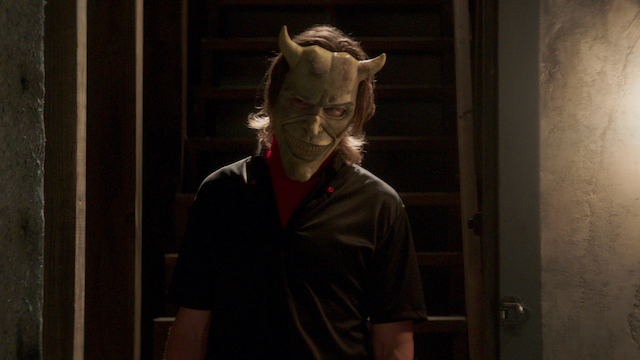Movies & TV / Reviews
The Black Phone Review
 Image Credit: Universal Pictures, Blumhouse Productions
Image Credit: Universal Pictures, Blumhouse Productions

Directed By: Scott Derrickson
Written By: Scott Derrickson and C. Robert Cargill; Based on the short story by Joe Hill
Runtime: 102 minutes
MPA Rating: Rated R for violence, bloody images, language and some drug use.
Mason Thames – Finney Shaw
Madeleine McGraw – Gwen Shaw
Ethan Hawke – The Grabber
Jeremy Davies – Terrence Shaw
James Ransone – Max
E. Roger Mitchell – Detective Wright
Troy Rudeseal – Detective Miller
Miguel Cazarez Mora – Robin
Director Scott Derrickson returns to the realm of horror after playing in the MCU sandbox with his new film The Black Phone. The new film finally arrives in theaters this week after multiple delays due to the ongoing pandemic. Derrickson’s return to horror is one of his strongest efforts to date, as he has woven a taut, suspenseful, nail-biting plot.
The Black Phone presents a terrifying premise, as a small Colorado town is besieged by a child abductor. The serial killer, dubbed “The Grabber,” preys on children, leaving a set of black balloons as his calling card. One such child who lives in fear of The Grabber (Hawke) is young Finney Shaw (Thames), who is also a victim of bullying at his middle school. Finney’s sister, Gwen (McGraw), appears to have some extra sensory abilities that local police detectives Miller (Mitchell) and Wright (Rudeseal) attempt to use in the process of their investigation. This is much to the chagrin of Finney and Gwen’s harsh, abusive father Terrence (Davies), who fears that Gwen has inherited her ESP gifts from his late wife.
Things grow worse for Finney after his best friend and sometimes protector, Robin (Mora), is taken by The Grabber before Finney becomes the latest victim of the deranged serial killer. Finney is forced to endure The Grabber’s insane, twisted games after The Grabber imprisons him in a basement dungeon. Finney’s only solace is the mysterious voices calling him from a broken, disconnected black phone on the basement wall. Somehow, the spirits of The Grabber’s previous victims can reach Finney from beyond using the phone, which might be Finney’s only key to escaping this nightmare.
Scott Derrickson and his co-writer and longtime collaborator C. Robert Cargill excel in building the suspense and terror of Finney’s ordeal into a dynamic third-act blowoff. The tension and fear are ratcheted up not by depicting excessive violence or gore, but by the fear of what might happen next. Fear does not necessarily come from watching a grisly act, but from the knots created in the mind when one wonders what could happen next. It’s that fear of the unknown that Derrickson taps into so effectively well. It makes watching The Black Phone for the first time that much more satisfying an experience.
The film’s minimalist use of Ethan Hawke as The Grabber is incredibly effective. His face is seldom shown in full view. The Grabber’s face is usually obscured behind variations of a terrifying, demonic mask designed by legendary visual effects and makeup artist Tom Savini and Callosum Studios. Most of the narrative is depicted from the perspective of Finney and Shaw, so only bits and pieces of The Grabber are shown. As a result, it maintains a strong level of ambiguity for the character, which amps up the fear and terror The Grabber evokes in both his victims and the audience. Hawke does well breaking from type in portraying a vile and terrifying presence, who is felt even when he is not onscreen.
Mason Thames and Madeline McGraw as the Shaw Siblings are the breakout performers in The Black Phone. Thames rises to the occasion in a difficult role, never breaking from the believability of Finney’s plight. Finney’s journey to find courage in the face of such a terrifying ordeal is central to this film, and Thames carries that weight on his shoulders very well. Madeleine McGraw as his compassionate, gifted sister Gwen is similarly exceptional with her performance. The child actors do commendable work here, exhibiting qualities and performance levels often missing in film and television shows.
The most significant drawback to The Black Phone is a comedic subplot involving a coked-up, amateur detective named Max (Ransone). Max is someone who crossed state lines due to his keen interest in solving The Grabber case. The subplot involving Max is incredibly campy, and while the movie is not without its moments of comedic levity, Ransone’s performance is far too goofy for the general tone of the film’s overall plot. The scenes involving Max venture far too close to breaking The Black Phone‘s suspension of disbelief.
Other than the Max scenes, Derrickson paces the film remarkably well. At a lean 102-minute runtime, there is no leftover heft here. While some subplots could have been drawn out further, there is no wasted motion here. It results in a viewing experience that’s tight, quick, suspenseful, and culminates in a gripping, memorable final act. The Black Phone is a horror film worth checking out in theaters for the first time.










